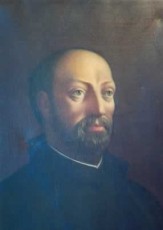Catholic Blesseds, Saints, Solemnities & Holy Days

Saint Jean de Brebeuf
Feast Day: October 19
Patronage: Canada
St. Jean de Brebeuf was born in Normandy, France. He was the uncle of poet Georges de Brebeuf. He became a Jesuit in 1617, joining the Order. He almost was expelled from the Society because he contracted Tuberculosis. Finally in 1622 he was ordained a Jesuit Priest.
In 1625 he sailed to Canada as a missionary, arriving on June 19th. He lived with the Huron natives near Lake Huron, and he learned their customs and language, becoming an expert, in fact, it is said that he wrote the first dictionary of the Huron language. Because of a war with England, Brebeuf was forced to return to France, but when the peace treaty was signed, he returned to the Hurons in 1634. His success as a missionary was very slow and it was only in 1635 that he made his first converts; fourteen was the number. The following year, the number went up to 86. The Jesuits were frequently blamed for disasters like epidemics, battles defeats, and crop failures.
He unsuccessfully attempted to convert the neutral Nation, on Lake Erie in 1640. Having failed this mission, he returned to Quebec in 1641 and remained there for three years. He returned to Huron in 1644 and finally experienced some success. By 1647 there were thousands of converted Hurons. In 1643 he wrote the Huron Carol, a Christmas Carol that is still used today, in a modified version. His charismatic presence in the Huron country helped cause a split between traditionalist Huron and those that wanted to adopt the European culture.
The Iroquois destroyed a large Huron village in 1648, and on March 16, 1649, 1,200 Iroquois captured the mission of St. Ignace and then a few hours later captured another Huron village where they seized Brebeuf and his fellow Jesuit Gabriel Lalemant. They were taken back to St. Ignace. There they were fastened to stakes and tortured to death by scalping, mock-baptism, using boiling water, fire, necklaces of red-hot hatchets and mutilation. According to Catholic tradition, St. Brebeuf did not make a single outcry while being tortured, astounding the Iroquois. Later they cut out his heart, and at it in hopes of gaining his courage. St. Brebeuf was fifty-five years old. His body was recovered a few days later, his body was boiled in lye to remove the flesh, and the bones became Church relics. His flesh was buried, along with Lalement’s, in one coffin. Today it rests in the Church of St. Joseph at the reconstructed Jesuit mission of Sainte-Marie among the Hurons near Midland, Ontario. In September 1984, Pope John Paul II prayed over Brebeuf’s skull before saying an outdoor Mass on the grounds of the Martyrs Shrine.
St. Brebeuf was canonized in 1930 with seven other missionaries, known as the North American Martyrs. He is a secondary patron saint of Canada. His feast day in Canada is celebrated on September 26th, while in the United States it is celebrated on October 19th. It said that the modern name of the Native North American sport of Lacrosse was first coined by Brebeuf, who thought that the sticks used in the game reminded him of a Bishop’s Crosier (Crosse in French, with the feminine definite article, la crosse).





